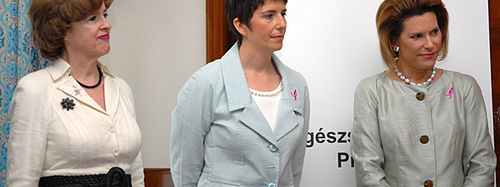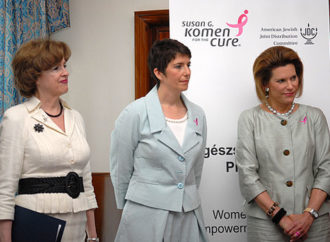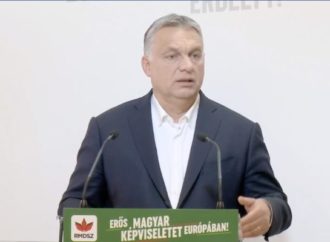The Hungarian daily NÉPSZAVA makes an analysis of the current relation between FIDESZ and the Hungarian minority parties in the neighboring states and shows that UDMR has become a strategic ally of Viktor Orban. NÉPSZAVA also analyzes the possibility for UDMR to get out of EPP along with FIDESZ, but shows that joining the Eurosceptic group would lead to the loss of the pro-EU Hungarian public, according to RADOR.
Full commentary from NÉPSZAVA (Center-Left newspaper, Opposition to the Orban regime):
On Monday, Viktor Orbán received the Presidents of Hungarian EPP organizations at the Carmelite Monastery in Budapest. Participated: Hungarian Deputy Prime Minister Zsolt Semjén, UDMR President Hunor Kelemen, President of the Hungarian Community of Slovakia, József Menyhárt, and President of Hungarian Vojvodina Union (UMV) István Pásztor.
According to reports, “Beyond the current issues of national strategy and European policy, Hungarian party leaders discussed the forthcoming European Parliament elections as well as economic development programs across borders with the help of the Hungarian government.”
The statement does not indicate what the current national policy issues are, and the Presidents of the parties have not made any statements about the content of those discussed at the meeting.
The fact that these Hungarian parties that are preparing to be part of the European Parliament are negotiating does not mean anything inappropriate, but there are still some points of view that leave some uncertainty about the real content of the official press release. In the previous European Parliamentary elections, there were no coordinated Hungarian campaigns of the EPP, nor did any of the Hungarian EPP member parties plan any danger of exclusion. Viktor Orbán and Fidesz have guaranteed direct support from the Hungarian Communist Party (MKP) in all elections so far, but in the case of the UDMR, this relationship of trust is relatively new.
At the first European elections in Romania, only the individual candidacy of László Tőkés against UDMR was supported. The approximation took place in the 2014 European elections, when Orbán took part in the Transylvanian electoral campaign and supported the presence of Hungarians in Romania at the elections. Since then, the UDMR has become a “strategic ally”, so that today we can argue whether cross-border leaders have discussed the harmonization of the campaign or what attitude the aforementioned are about to have in the case of exclusion or ” voluntary departure “of Fidesz from EPP. The latter suspicion is supported by the fact that UMV chairman István Pásztor also attended the meeting, although Serbia is not part of the EU, so there is no campaign for UMV for the European elections, but the Hungarian party in Serbia is an associate member of the EPP.
As in 2014, Fidesz provides a place on its list for a deputy in Vojvodina (Andor Deli), but also a politician Andrea Bocskor from the KMKSZ (Hungarian Cultural Transcarpathian Union), who did not attend the meeting, the reason being that he is neither a full member nor an associate member of the EPP. If the talks “really had national strategy issues,” the presidential election in Ukraine would have made the Hungarian representation in Transcarpathia present, and it is equally incomprehensible why the representatives of the Hungarian community outside Hungary being in the most difficult economic situation missed the meeting.
Before the meeting, UDMR and MKP reported that they would not vote for the exclusion or suspension of Fidesz. The UDMR president avoided answering the question of what attitude UDMR would take if Fidesz was excluded, whether it would follow him or not in one of the Eurosceptic groups. Hunor Kelemen just said that, within his party, the matter is irrelevant, and denied that the issue of a possible UDMR departure would have arisen. So did the MKP.
The campaign by Orbán and Fidesz and the existence of an EPP group of all Hungarian parties are understandable as it is a signal that in the case of sanctioning EPP, it would lose more than the Fidesz group consisting of 13-14 members.
But this message could contain the idea that the Hungarian satellite formations outside Hungary would follow Orbán’s party no matter where Fidesz was in the new formula after the May elections.
Although in Transylvania and Slovakia the camp of Orbán’s supporters is significant, the announced message may have two sides and may have a boomerang effect. Neither UDMR nor UMV stand very well in case of the polls, both lost supporters after the elections, especially people who support Romanian and Slovak parties that are loyal to the EU, Union values, the rule of law and democracy – young people and the urban intelligence. Both parties count on two mandates, but according to surveys UDMR would have only one eligible place, and UMV access is uncertain because it is under five percent.
The presidential elections in Slovakia, which promoted Zuzana Caputova to the presidency, partly demonstrated that the Hungarians in Slovakia are voting less and less according to ethnicity.
According to the forecasts in Romania, the new political forces – the 2020 USR-PLUS Alliance – are becoming more and more popular among the Hungarian population in major cities. In Cluj, for example, more than a third of the Hungarian electorate signaled for sure that on May 26th they will vote for the Romanian alliance of parties.
An important factor is also the fact that in the Hungarian communities there is a great deal of support for the EU, largely because they have faith in Brussels that they will remedy the situation regarding the rights of minorities. The stable ethnic electorate of UDMR and MKV does not yet analyze how Orbán’s views on the existence of strong national states can be agreed with their objective that more and more problems reach the area of influence of the community regulation.
Instead, the more intelligent part of society mainly in the big cities are moving away from the two minority formations because they have long questioned this issue, and also the question of the rule of law in Hungary. The UDMR and MKV campaign aims to obtain a European legal guarantee for their minority rights – which are currently the Member States, as well as their electoral base awaits this from Brussels.
In the long run, this “schizoid” state cannot be maintained. It is also almost impossible for the Hungarian electorate in Transylvania and Slovakia not to be afraid of extremists in their countries, who are uncertain to consider it as a pardonable sin if they follow Fidesz into an extremist and eurosceptic group.
Source: G4Media
(TFP translation)



































Leave a Comment
Your email address will not be published. Required fields are marked with *